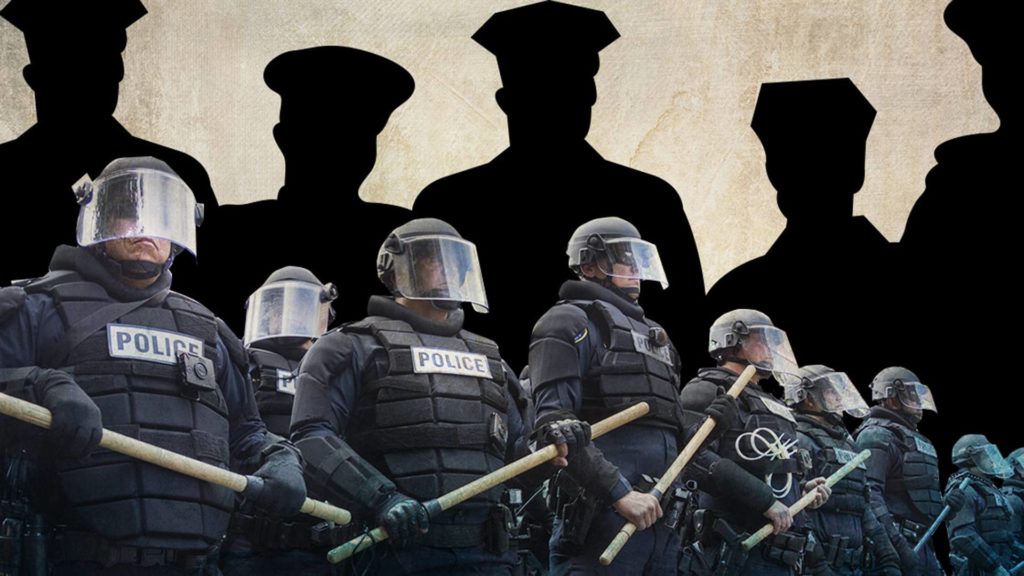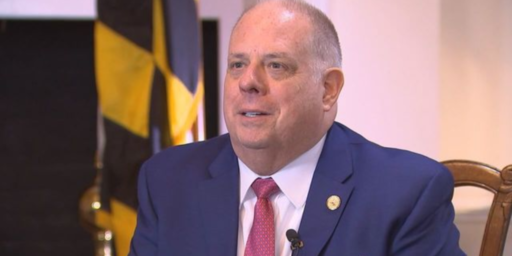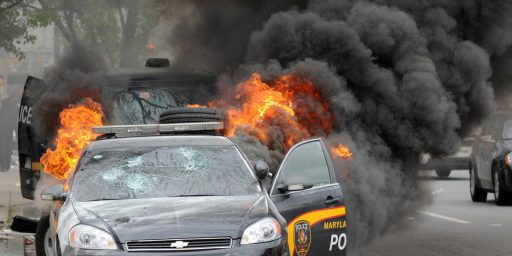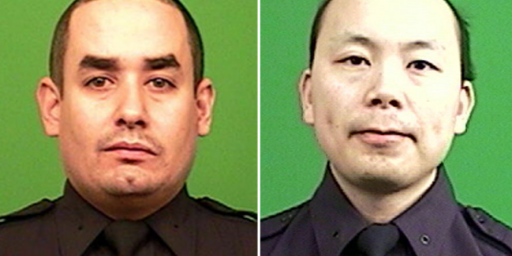Maryland Removes Police Protections over Hogan’s Veto
The Free State may have gotten just a little freer.

WaPo (“Maryland enacts landmark police overhaul, first state to repeal police bill of rights“):
Maryland enacted historic police accountability measures Saturday, becoming the first state to repeal its powerful Law Enforcement Officers’ Bill of Rights and setting new rules for when police may use force and how they are investigated and disciplined.
The Democratic-majority legislature dealt Republican Gov. Larry Hogan a sharp rebuke, overriding his vetoes of measures that raise the bar for officers to use force; give civilians a role in police discipline for the first time; restrict no-knock warrants; mandate body cameras; and open some allegations of police wrongdoing for public review.
Each bill had been hailed by criminal justice advocates as having the potential to make policing in the state fairer and more transparent. Democrats, who hold large majorities in the legislature, made enacting them a top priority after months of protests over the police-involved deaths of unarmed Black men and women.
[…]
The changes do not go as far as some social justice advocates had hoped: Discipline will now largely be decided by civilian panels, for example, but police chiefs maintain a role. Some activists wanted the panels to act independently of police.
Still, the legislation imposes one of the strictest police use-of-force standards in the nation, according to experts; requires officers to prioritize de-escalation tactics; and imposes a criminal penalty for those found to have used excessive force.
[…]
Hogan, who is weighing a presidential bid in 2024, has built a varied record on criminal justice issues — championing drug treatment rather than jail time for nonviolent offenses but aggressively seeking tougher penalties for violent crimes. He has refused to free many prisoners approved for release by the state’s parole board and has consistently sided with police unions in matters regarding officer protections and accountability.
In his veto letter Friday night, Hogan wrote that the three policing bills would “erode police morale, community relationships and public confidence.”
“This will result in great damage to police recruitment and retention, posing significant risks to public safety throughout our state,” the letter said.
Also on Saturday, the General Assembly overturned an earlier Hogan veto of a bill that would abolish life sentences without parole for juveniles. The legislation allows prisoners who were juveniles when they were convicted to appeal to a judge for release after they have served 20 years.
Baltimore Sun (“Maryland legislators pass landmark police reform package into law, overriding Gov. Hogan’s vetoes“):
Brushing aside vetoes from Gov. Larry Hogan, Maryland legislators on Saturday passed a landmark police reform package into law that supporters hailed as a major step toward transforming policing in the state.
Hogan, a Republican, contended that central provisions of the sweeping four-part Maryland Police Accountability Act go too far and will treat police officers unfairly. He vetoed three bills Friday evening containing those sections.
[…]
The legislation will overhaul the disciplinary process for officers accused of misconduct, allow public scrutiny of complaints and internal affairs files, and create a new legal standard requiring that police use only “necessary” and “proportional” force. Officers who use excessive force will face additional criminal penalties, including up to 10 years in prison. Also, police will be limited on when they can obtain so-called “no-knock” warrants or raid homes at night.
[…]
House of Delegates Speaker Adrienne A. Jones, a Baltimore County Democrat, sponsored key portions of the package.
“Now, for the first time in our nation’s history, the rights of officers will not be held above the rights of individuals, and policing in Maryland will be transparent and citizen-centered,” she said.
Hogan said Friday in his veto message that the police reform effort was “overtaken by political agendas that do not serve the public safety interests of the citizens of Maryland” and that the bills he vetoed would “further erode police morale, community relationships and public confidence.”
Republican lawmakers echoed those concerns and raised worries that provisions would leave officers fearful that split-second decisions under dangerous circumstances might cost them their jobs or send them to prison. Maryland Fraternal Order of Police President Clyde Boatwright warned that the legislation would have “a significant impact on the hiring and retention of law enforcement officers in our state.”
Sen. Jill P. Carter, a Baltimore Democrat who fought for years to pass policing legislation, responded Saturday on the Senate floor to Hogan’s comments. What corrodes community trust in police, Carter said, is years of frustration over abuses that go unpunished, protests that go unheard and a broken system that carries on unchanged.
Carter cited scores of people killed by law enforcement in Maryland over the past two decades and notorious instances of corruption that went unchecked for years. Baltimore residents filed numerous complaints about since-convicted officers on the Baltimore Police Department’s infamous Gun Trace Task Force, Carter said, but members of the force continued to abuse the public with impunity.
I don’t live in Maryland and haven’t followed the ins and outs of this bill, so don’t have a strong opinion on many of its provisions. But the overall tenor of it strikes me as reasonable. Police officers are empowered to use deadly force against citizens as a condition of their employment but they are supposed to be trained professionals with excellent judgment and forbearance. Too many in the community, and certainly those that are poor and non-white, see the police as more a threat to the public safety than the criminals themselves.
When an officer kills someone, there should be a thorough incident review that’s transparent to the public. For good officers, that’s a great benefit as it will clear their reputation and that of the larger force. For bad officers, it should lead to their prompt removal from the force, a signal that misconduct won’t be tolerated.
While there are extreme cases where a no-knock warrant is necessary, most police forces have already moved away from them, rightly seeing them as escalatory. In the DC area, all of the local forces have moved in that direction—with the notable exception of Prince George’s County, Maryland, which is notoriously awful (but pledged in February to undertake multiple reforms).
Holding police criminally liable for misjudgment gives me some pause, although I strongly suspect enough protections are built into the law to make only the most egregious cases result in charges. But everyone who makes it through initial training isn’t cut out to be a cop. Those who lack the nerves and judgment to do it without being a menace to the community simply have to be removed.




I suspect one of the things making it harder to get good recruits into the police academy is the increasing reputation of the police as thuggish goons. Holding active officers accountable may drive out the worst of that lot, which in turn might make decent people feel it is a place for them, so may actually increase the number of desirable recruits and decrease the number only interested in a legal way to bust heads.
When you look at the itemization of the protections that are being repealed, it brings home how cosseted a class of individuals police have been. No wonder some express their worse tendencies and go rogue.
While in Boston, it turns out, a long time police union prez is a child molester and the department covered it up.
For years, the Boston Police kept a secret: the union president was an alleged child molester
Despite 1995 evidence, Patrick Rose kept his badge, worked on child sexual assault cases, and ascended to power in the police union. He went on to allegedly molest five other children.
Given that the press and citizens are finally examining police behavior, it seems that cover ups and rogue cops appear to be prevalent rather than exceptions. This is the second or third BPD cover up of bad behavior by an officer that the Globe has reported on in the last few months.
@Sleeping Dog:
Largely unprovable but my strong hunch is that rogue cops are in fact exceptions but that the culture makes coverups the norm. Loyalty to one’s brother officers is more sacrosanct than loyalty to the community or the profession. It’s really the opposite of the military in that regard. (Not that coverups don’t happen but there’s a whole lot of training and education reinforcing the duty to report misconduct.)
All too often, No knock warrants are being replaced with knock-and-smash — you have a few seconds (less than 10) to open the door before it is knocked in and your home invaded by people claiming to be police.
Do they shout “police” right before they smash in the door and invade, or do they smash in the door and shout “police” as they are invading? Seems like a distinction without a difference.
The police and their union have done this to themselves. They chose to close ranks in every case, to fight every attempt at oversight, to lie to protect each other, to break the law to protect each other. They’ve turned themselves into little more than gangs because they failed to understand that their power rests on law, not on their use of force. We’re suddenly back to 1968 with cops being called pigs and a whole generation that takes it as an article of faith that all cops are bastards.
@Gustopher:
I’m still waiting for one of these police unions to explain to me what I am legally entitled to do with my lawfully-registered gun when criminals burst through my front door yelling “Police! Freeze!”. Can I defend my family and my home, or must I take the criminals at their word?
Will it be possible to revisit the “Hogan is one of those rare ‘good’ Republicans, not at all like Trump” thought that I recall getting some traction in the previous year, now that he’s sided with the guys who took Freddy Gray for a ride?
(Asking for a friend.)
Isn’t the saying we hear all the time “ignorance of the law is no excuse”? Why is it the people whose job it is to specifically know the law and who are paid huge sum to train on it are held to a lower standard for culpability than the general public?
@James Joyner:
Cops that cover up for rogue cops are also rogue cops.
@Stormy Dragon:
“Rogue cops” are, by definition, striking out on their own with their lawless behavior. If the other cops are covering for it, we have different phrases for that — “criminal conspiracy,” “accessory after the fact,” or at the very least “obstruction of justice.”
@Stormy Dragon: What is so hard about holding cops to the same laws as the rest of us?
@Stormy Dragon:
If you make a mistake on your job, what happens? A project is late, a burger doesn’t get flipped, or something like that. For most people, it’s low stakes shit, and no one is trying to sue you or send you to jail.
If a police officer makes a mistakes, the costs are higher — and the urge to criminalize those mistakes are also higher.
There has to be a balance between protecting the public from bad police, and protecting police from criminal charges for good faith errors. We are way out of balance right now, and are not protecting the public from bad police.
I think the right model is probably more akin to how we police doctors with licensing, malpractice insurance and criminal charges in only rare occurrences. But, it would take some heavy lifting to get there, and the police really like the system of no accountability that they have now.
@MarkedMan:
That’s an admirable sentiment, but this will all be (and already is being) perceived by the blue side of the line – unilaterally, good cops and bad – as calling open season on cops for anyone who wants to beat a rap by pushing a complaint. The rank and file response will certainly be a pullback on actively initiated policing, premised in the attitude that “I am not risking my pension. Let them kill each other. Unless I’m directly ordered, I didn’t see anything.” We’ve certainly seen that response in other jurisdictions that have gone down this road, with the associated spikes in crime that you’d expect to accompany it.
I’m not defending that or saying that it is the way that it should be. I’m simply telling you that it is what will happen. They are not going to risk professional suicide or imprisonment in a climate where they feel that they’ve got targets on their backs unless they are directly ordered to do so, and I can’t really blame them for that attitude. I get that there is a lot of discomfort with police tactics, and certainly there are cops who have no business wearing the badge & should be removed, but I’d offer up that a great deal of it seems to emanate from the insulated position of the middle class armchair quarterbacking situations it doesn’t have any experience with. People who generally don’t have to deal with violence, who aren’t regularly exposed to it, are always going to be uncomfortable with it and think that there should always a peaceful way to resolve any situation, however charged it may be. The Kumbahyah approach, if you will. I obviously think that’s misguided and utopian, but it will play out how it plays out. At this point the only way out is through. These changes are going to happen, and we’ll have to see what happens further as a result of them. Be careful what you wish for.
@HarvardLaw92:
There is definitely some of that. But working in the Criminal Legal System reform space, there’s also a lot of that also coming from folks and communities that are deeply familiar with police tactics as they have been used to traumatize said communities for literal generations.
I expect/fear that HL92 will be right at least in the short term, and you can count on the right wing noise machine to hype every example they can find. Heck, saw an article today how a cop in Minneapolis quit because he expects the city to burn regardless of the Chauvin verdict and he didn’t want to risk his life in the event.
But in the long run, getting rid of the cops who are there for the power trip (at best; racists and criminals with a badge at worst) is essential. There is a massive cultural issue in the American police forces today, and these are the baby steps to rooting it out. Where I’m pessimistic is if we as a society can keep the long term focus necessary to change policing in this country. Which involves changing attitudes about guns, the war on drugs, mental health, funding & forfeiture, and a million other things that aren’t as simple as blaming out of control thugs masquerading as cops.
@Just Another Ex-Republican:
The focus will last no longer than the rise in crime which tends to result, IMO. We’ve already seen that response in Minneapolis – it’s relatively easy to support something in a detached, theoretical sense, as long as it doesn’t directly affect you. Once it does begin to affect you, the attitude switches from one of theoretical justice to active safety and self preservation quite quickly.
Short version is that the second that people find themselves exposed to crime and violence in an anything beyond a reading in the paper about something that happened in somebody else’s neighborhood context, the calls for more police officers on the street and dealing with the crime by whatever means necessary overpower any other factors. Minneapolis, which not so long ago was talking about replacing its police department with a whole different public safety model, is now instead approving millions in new spending to get more officers into the existing department as quickly as they can be hired. That’s solely the result of pissed off constituents who might support police reform, but who absolutely aren’t prepared to risk their own safety / property values to accomplish it.